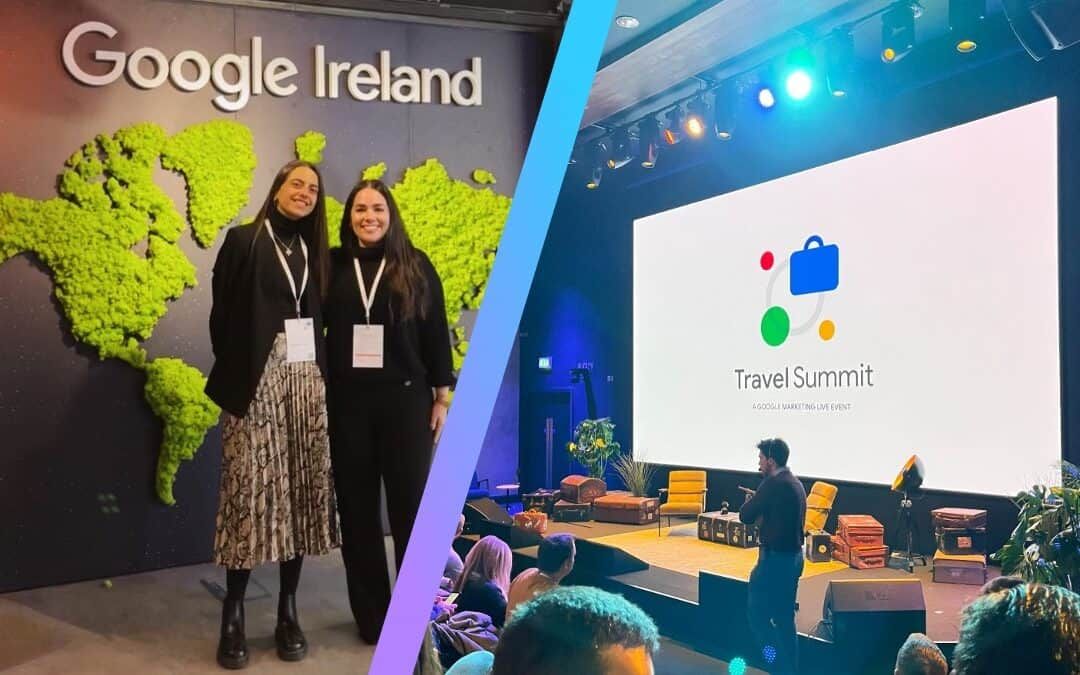
What we learned at Google’s Travel Summit EMEA in Dublin
Last April, PROS learned about travel trends and insights from Google’s Travel Summit EMEA from our peers in the region in Dublin, we were also able to witness that nothing compares to one-to-one interactions and exchanges of ideas – in the end, travel is about people, it is about connection and this Summit was an opportunity to reinforce and reinvigorate our connections.
The two-day event included keynotes from global brands like Meliá Hotels, Air France, Radisson, and Oyo, and a deep dive into AI, travel trends, and the behavior of the ever-changing consumer by Google, The Future Laboratory, and WPP.
Record days in sales and travel demand.
According to Google, demand for travel in EMEA is above pre-pandemic levels with a 32% and 45% increase in Google search versus 2019 (Q1 2023 vs Q1 2019) for flights, and accommodation-related queries respectively.
Travel brands have seen this demand reflected in their booking patterns as there have been record-breaking sales days across the globe since 2022.
A key learning from the pandemic is that users value the peace of mind that booking directly on an airline’s website can give them – if their flight is cancelled, they know exactly what to do and who to contact.
And while there is concern about the economy, 72% of users in this study in EMEA are expecting to travel in 2023.
Loyalty is up for grabs.
The Google Insights team shared that 36% of users in EMEA are open to trying new travel brands. People are also spending more time researching where to go and how to get there.
Compared to 2019, the booking window has increased by an average of 51%, signifying that users are very thoughtful and conscious of how they spend their money, and they demand a fair value exchange – having the best experience is as important as price.
Generic searches that have nothing to do with a brand, such as flights to Paris, have also slightly increased in the region from 74% in January 2019, to 78% in April 23. Being able to respond to these search terms in a scalable way via Paid and Organic results in Google is imperative for travel brands to capture this growing demand, particularly when 70% of this demand is actionable. There is also a whole world of incremental demand in terms such as “flights to USA under $500” that travel brands can expand to – the ultimate objective is to cover your basis and expand the type of search with incrementality in mind.
Digital nomads continue to be on the rise.
It is no surprise that in this post-pandemic world, people expect to have more control over their working patterns. The new remote/hybrid reality has enabled companies to allow employees to work from different cities and countries for a determined period of time, paving the way for a more frictionless, nomadic lifestyle.
Travel and country brands are recognizing this opportunity and embarking on a quest to cater to this new type of traveler: Barbados’ Digital Nomad Visa program allows people to work remotely in Barbados for a maximum of 12 months while Airbnb’s partnership with the Caribbean Tourism Organization boosts long-term rentals in the region.
As the pandemic started to wind down, PROS and its airline, vacation packages and hotel partners started exploring this concept via airTRFX as the platform allows our partners to promote flights, vacation packages and hotel stays showcasing customized itineraries and stays ranging from 1-365 days.
Business + Leisure = Bleisure.
Business travel took a big hit during the pandemic and while it is back, Chris Sanderson, from the Future Laboratory highlighted the concept of “workers wanting to feel a greater sense of balance at work”. New generations, for example Gen Z’s, want to travel in a quest for escapism, and wonder, shifting to prioritize intimacy and balance.
One way in which these newer generations are exploring this concept of balance is by extending work trips, when possible, and adding a couple of leisure days into their itinerary to explore and immerse themselves in the culture of the city they are visiting.
Travel brands can use data to identify bleisure-specific destinations along with the duration of the trips sold to that destination, and promote additional weekend flight deals, vacation packages and hotel stays to these audiences wanting to make their work trip a bit more meaningful.
Traveltainment and inspiration.
The Future Laboratory shared that when looking for a destination, travel inspiration comes from TV shows (we were surprised as well!) and Social Media, which reinforces the fact that when it comes to hotels and airlines, the focus should continue to be on setting the user in a transactional mindset as soon as they interact with the brand and its website – setting the user in a transactional environment by telling them how much “that flight to New York” they are already convinced about will cost, will ease the path to conversion.
PROS´s airWire has allowed our partners to communicate – in real-time – how much it costs to take that trip from London to Paris via emails, display ads and Google´s Paid Search ads, even before the user visits an airline´s website.
Travel is indeed back – and reloaded
Travel brands must be bold, loud and respond fast to the ever-changing consumer. It is important to always communicate their value proposition – whether it is price or elevated experiences and of course, to simplify – and shorten – the booking process.
